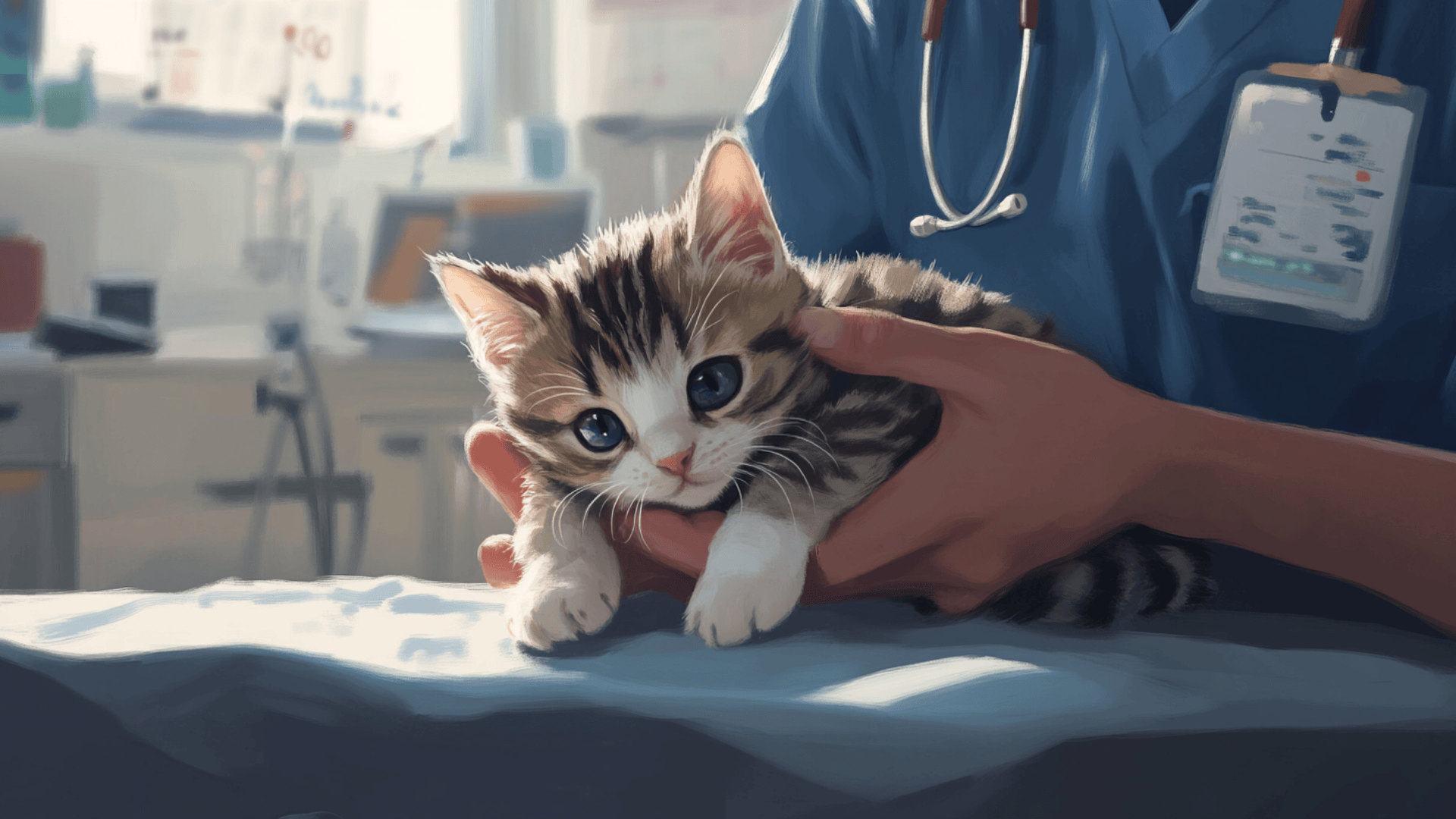If you’ve ever wondered, can roundworms kill a cat?, the answer might surprise you. While adult cats often show few signs, roundworms can be deadly for kittens or sick pets.
Maybe your cat has been acting off, or you found something odd in their litter box, and now you’re trying to figure out what’s going on.
This blog explains everything in a clear, simple way so you’re not left guessing.
We’ll go over what roundworms are, how they spread, the symptoms to look for, and what treatment and prevention steps to take.
By the end, you’ll know how to protect your cat and when it’s time to call the vet.
Could a tiny parasite really be such a big threat? Let’s take a look.
What are Roundworms in Cats?
Roundworms are long, spaghetti-like parasites that live in a cat’s intestines. They’re one of the most common types of worms found in cats. These worms feed on the food your cat eats and can grow several inches long.
Cats can get roundworms in a few different ways:
- By eating roundworm eggs from contaminated soil or feces
- By hunting and eating infected rodents or birds
- Kittens can get them through their mother’s milk if she’s infected
Once inside the cat’s body, the eggs hatch and the worms start to grow. Some even travel through the body before settling in the intestines.
Roundworms are especially risky for young kittens, but they can affect cats of any age. Knowing how they spread can help you take the right steps to prevent an infection in the first place.
Can Roundworms Kill a Cat?
Roundworms can be serious, especially if the infection is left untreated. The risk depends on the cat’s age and overall health. Some cats may carry the worms without symptoms, while others can become very sick or even die.
Kittens
Kittens are most at risk from roundworms. Their small bodies and weak immune systems can’t handle a heavy worm load.
Worms can block their intestines, cause belly swelling, and lead to poor growth or severe weakness. In bad cases, untreated roundworms can be fatal for kittens.
Adult Cats
Healthy adult cats usually handle roundworms better. They may not show symptoms right away, or at all.
But a large number of worms can still cause trouble, like vomiting, weight loss, and poor coat condition. Treatment is still important to prevent long-term issues or spreading the worms to others.
Elderly or Sick Cats
Older cats or those with health problems are more at risk than healthy adults.
Their bodies may not fight off the infection well, making symptoms worse and recovery harder. In serious cases, roundworms can cause life-threatening problems like pneumonia or gut blockages.
Signs Your Cat Might Have Roundworms

Roundworms don’t always show clear signs at first, but some symptoms are easy to spot once you know what to look for.
Here are common signs that your cat might have roundworms:
-
- Vomiting: Sometimes with visible worms in it
- Pot-bellied appearance: Especially in kittens
- Coughing: If worms have migrated to the lungs
- Weight loss: Even if your cat is eating normally
Dull or rough coat: A sign of poor health
- Visible worms in poop or around the rear: Often look like spaghetti
If you notice any of these symptoms, it’s a good idea to get your cat checked by a vet. Early treatment can help prevent serious problems.
How are Roundworms Diagnosed?
The most common way to diagnose roundworms is through a fecal test done by your vet. They’ll check a sample of your cat’s poop under a microscope to look for roundworm eggs.
Routine testing is usually part of a regular check-up, especially for kittens or newly adopted cats.
But if your cat shows signs like vomiting, weight loss, or a pot-bellied look, you should take them in for testing right away.
Catching roundworms early makes treatment easier and helps prevent the spread to other pets or even humans.
How are Roundworms Treated?
Roundworms are usually treated with deworming medications that kill the parasites in your cat’s intestines. These meds are safe and work quickly when given as directed.
There are several types of dewormers that your vet may use, including pills, liquids, and topical treatments. Some require a single dose, while others need to be repeated over several weeks to eliminate the worms fully.
In most cases, your vet will recommend a follow-up test to make sure the worms are gone.
Even if your cat seems better, it’s important to finish the full treatment and return for any follow-up visits. This helps prevent a new infection or leftover worms from causing problems later on.
What Happens if You Don’t Treat Roundworms?
Leaving roundworms untreated can lead to serious health issues, especially in kittens and older cats.
Here’s what can happen if the infection is ignored:
- Intestinal blockage: A heavy load of worms can block the gut, causing pain, vomiting, or even a rupture
- Lung migration: Some worms travel through the lungs, leading to coughing, breathing issues, or pneumonia
- Death: In severe or untreated cases, especially in kittens, roundworms can be fatal
A cat’s swollen belly might seem harmless, but it can be an early sign of a more serious problem, like a roundworm infection or digestive issue. Treating roundworms early is the best way to keep your cat safe and healthy.
Can Humans Catch Roundworms from Cats?
Yes, humans can catch roundworms from cats, although it’s not very common. This is called a zoonotic infection.
Here’s how the risk increases:
- Handling cat poop or soil where infected cats have gone
- Not washing hands after cleaning the litter box
- Letting kids play in areas where cats roam
To stay safe:
- Always wash your hands after handling your cat or cleaning the litter box
- Keep your cat’s litter box clean
- Don’t let your cat hunt or eat wild animals
- Deworm your pets regularly, as recommended by your vet
Being aware of the risks helps protect both you and your pet.
How to Prevent Roundworms in Cats
Preventing roundworms starts with good habits at home. One of the most important steps is keeping the litter box clean. Scoop it daily to avoid a buildup of eggs that could reinfect your cat.
Regular deworming is also key. Your vet can suggest a schedule based on your cat’s age and lifestyle. Even indoor cats may need routine treatment, especially if they were once strays or live with other pets.
Keeping your cat indoors can reduce exposure to infected soil, prey, or other animals. And don’t forget to clean food and water bowls often. Dirty dishes can carry germs and parasites if not washed regularly.
With a few simple habits, you can lower the chances of roundworms and keep your cat healthier in the long run.
What to do if Your Cat Has Roundworms
If your cat is diagnosed with roundworms, quick action is important. Start the treatment right away using the medication your vet provides. Follow the directions carefully, and don’t skip doses.
It’s also important to clean your home. Wash your cat’s bedding, vacuum carpets, and scrub the litter box. Roundworm eggs can survive in the environment, so cleaning helps stop the cycle.
If you have other pets, talk to your vet about getting them tested or treated. Roundworms can spread easily, especially if your animals share spaces.
While your cat is being treated, try to limit their contact with other pets to avoid passing the worms around.
These simple steps can make a big difference in clearing the infection and protecting your whole household.
Conclusion
Roundworms may seem small, but they can cause big problems, especially in kittens or cats with health issues. Now you know how to spot the signs, why treatment matters, and how to prevent future infections.
If your cat ever shows symptoms, don’t wait. Taking action early can make all the difference.
Understanding if roundworms can kill a cat isn’t just about knowing the risks—it’s about keeping your pet safe and healthy.
One last thing to remember: even indoor cats can get roundworms, so regular vet visits and clean habits are a must.
<p”>Want to learn more about your cat’s health? Check out our other helpful blogs for simple tips and info every pet owner should know.





